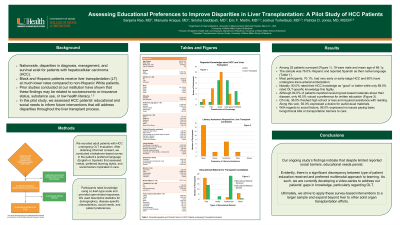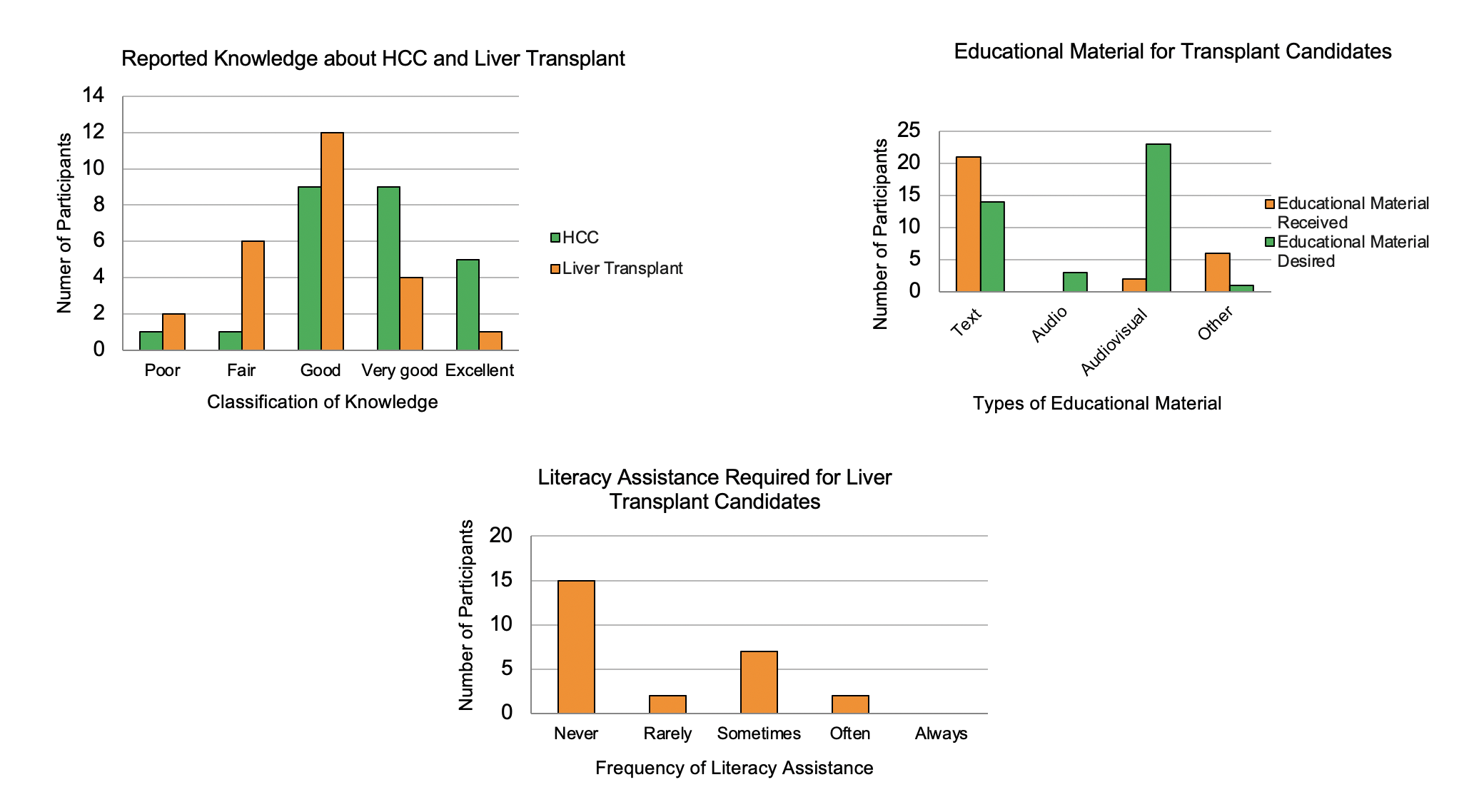Sunday Poster Session
Category: Liver
P1202 - Assessing Educational Preferences to Improve Disparities in Liver Transplantation: A Pilot Study of HCC Patients
Sunday, October 27, 2024
3:30 PM - 7:00 PM ET
Location: Exhibit Hall E

Has Audio
.jpg)
Sanjana Rao, MD
University of Miami Miller School of Medicine
Miami, FL
Presenting Author(s)
Sanjana Rao, MD1, Manuela Araque, MD1, Sirisha Gaddipati, MD2, Eric Martin, MD3, Joshua Turkeltaub, MD1, Patricia Jones, MD, MSCR1
1University of Miami Miller School of Medicine, Miami, FL; 2University of Miami Miller School of Medicine at Jackson Memorial Hospital, Miami, FL; 3Jackson Health System, Miami, FL
Introduction: Disparities in diagnosis, management, and survival persist for patients with hepatocellular carcinoma (HCC). Black and Hispanic patients receive liver transplantation (LT) at much lower rates compared to non-Hispanic White patients. Prior studies have shown that these findings may be related to socioeconomic or insurance status, substance use, or low health literacy.1,2 In this pilot study, we assessed HCC patients’ educational and social needs to inform future interventions that will address disparities throughout the liver transplant process.
Methods: We recruited adults with HCC undergoing OLT evaluation. After obtaining informed consent, we conducted a telephone-based survey in English or Spanish per patient preference. We assessed educational needs and preferred learning styles. Participants rated HCC and OLT-specific knowledge using a Likert-type scale and provided open-ended responses. We used descriptive statistics for demographics, disease-specific characteristics, social needs, and patient preferences. This study was approved by the Institutional Review Board and funded by the ACG Medical Resident Research Award.
Results: Among 25 patients, 19 were male. Mean age was 66.1 years. The sample was 76.0% Hispanic and preferred Spanish (Table 1). Most participants, 70.1%, had very early or early-stage HCC and 60% have undergone trans-arterial embolization. Notably, 92.0% rated their HCC knowledge as “good” or better while only 68.0% rated OLT-specific knowledge this highly. Although 84.0% of patients reported receiving text-based materials about their disease, only 46.0% voiced a preference for written education (Figure 1). Of note, 36.0% finished high school or less and the same amount required assistance with reading. Along this vein, 92.0% expressed a desire for audiovisual materials. With regards to social factors, 96.0% expressed no issues paying basic living/clinical bills or transportation barriers to care.
Discussion: Our ongoing study’s findings indicate that despite limited reported social barriers, educational needs persist. Evidently, there is a significant discrepancy between type of patient education received and preferred learning style. As such, we are currently developing a video-series to address our patients’ gaps in knowledge, particularly regarding OLT. Ultimately, we strive to apply these survey-based interventions to a larger sample and expand beyond liver to other solid organ transplantation efforts.

Note: The table for this abstract can be viewed in the ePoster Gallery section of the ACG 2024 ePoster Site or in The American Journal of Gastroenterology's abstract supplement issue, both of which will be available starting October 27, 2024.
Disclosures:
Sanjana Rao, MD1, Manuela Araque, MD1, Sirisha Gaddipati, MD2, Eric Martin, MD3, Joshua Turkeltaub, MD1, Patricia Jones, MD, MSCR1. P1202 - Assessing Educational Preferences to Improve Disparities in Liver Transplantation: A Pilot Study of HCC Patients, ACG 2024 Annual Scientific Meeting Abstracts. Philadelphia, PA: American College of Gastroenterology.
1University of Miami Miller School of Medicine, Miami, FL; 2University of Miami Miller School of Medicine at Jackson Memorial Hospital, Miami, FL; 3Jackson Health System, Miami, FL
Introduction: Disparities in diagnosis, management, and survival persist for patients with hepatocellular carcinoma (HCC). Black and Hispanic patients receive liver transplantation (LT) at much lower rates compared to non-Hispanic White patients. Prior studies have shown that these findings may be related to socioeconomic or insurance status, substance use, or low health literacy.1,2 In this pilot study, we assessed HCC patients’ educational and social needs to inform future interventions that will address disparities throughout the liver transplant process.
Methods: We recruited adults with HCC undergoing OLT evaluation. After obtaining informed consent, we conducted a telephone-based survey in English or Spanish per patient preference. We assessed educational needs and preferred learning styles. Participants rated HCC and OLT-specific knowledge using a Likert-type scale and provided open-ended responses. We used descriptive statistics for demographics, disease-specific characteristics, social needs, and patient preferences. This study was approved by the Institutional Review Board and funded by the ACG Medical Resident Research Award.
Results: Among 25 patients, 19 were male. Mean age was 66.1 years. The sample was 76.0% Hispanic and preferred Spanish (Table 1). Most participants, 70.1%, had very early or early-stage HCC and 60% have undergone trans-arterial embolization. Notably, 92.0% rated their HCC knowledge as “good” or better while only 68.0% rated OLT-specific knowledge this highly. Although 84.0% of patients reported receiving text-based materials about their disease, only 46.0% voiced a preference for written education (Figure 1). Of note, 36.0% finished high school or less and the same amount required assistance with reading. Along this vein, 92.0% expressed a desire for audiovisual materials. With regards to social factors, 96.0% expressed no issues paying basic living/clinical bills or transportation barriers to care.
Discussion: Our ongoing study’s findings indicate that despite limited reported social barriers, educational needs persist. Evidently, there is a significant discrepancy between type of patient education received and preferred learning style. As such, we are currently developing a video-series to address our patients’ gaps in knowledge, particularly regarding OLT. Ultimately, we strive to apply these survey-based interventions to a larger sample and expand beyond liver to other solid organ transplantation efforts.

Figure: Figure 1. Assessing Patient Education Approaches regarding HCC and Liver Transplantation
Note: The table for this abstract can be viewed in the ePoster Gallery section of the ACG 2024 ePoster Site or in The American Journal of Gastroenterology's abstract supplement issue, both of which will be available starting October 27, 2024.
Disclosures:
Sanjana Rao indicated no relevant financial relationships.
Manuela Araque indicated no relevant financial relationships.
Sirisha Gaddipati indicated no relevant financial relationships.
Eric Martin indicated no relevant financial relationships.
Joshua Turkeltaub indicated no relevant financial relationships.
Patricia Jones indicated no relevant financial relationships.
Sanjana Rao, MD1, Manuela Araque, MD1, Sirisha Gaddipati, MD2, Eric Martin, MD3, Joshua Turkeltaub, MD1, Patricia Jones, MD, MSCR1. P1202 - Assessing Educational Preferences to Improve Disparities in Liver Transplantation: A Pilot Study of HCC Patients, ACG 2024 Annual Scientific Meeting Abstracts. Philadelphia, PA: American College of Gastroenterology.

